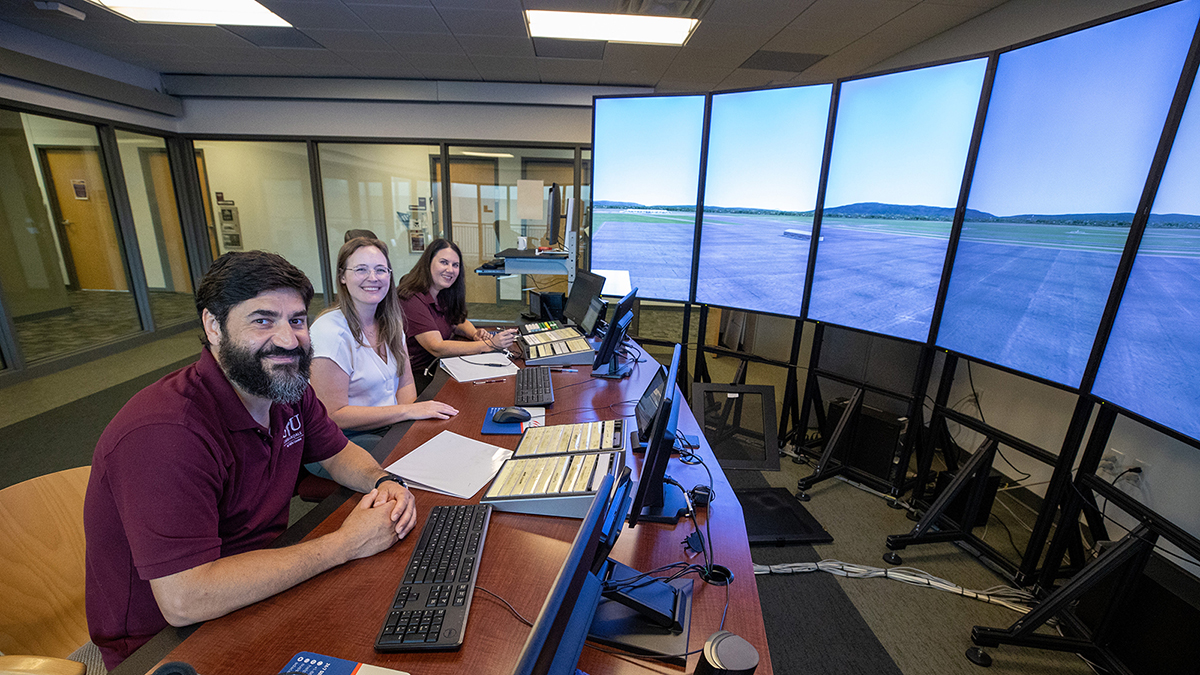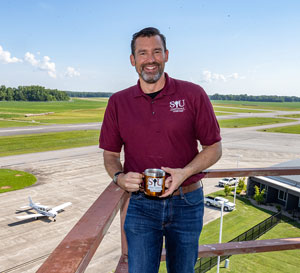
SIU faculty (top photo, from left) Matt Romero, Stephanie Chambers-Baltz and Amy Rutledge and Elliott Benton (bottom photo) are studying air traffic controllers’ mental health with a goal of providing recommendations to improve their mental health and reduce attrition rates. Romero, Chambers-Baltz and Rutledge are in the School of Aviation’s simulated air traffic control tower, and Benton is in the Southern Illinois Airport control tower. (Photos by Russell Bailey)
July 22, 2025
SIU research focuses on air traffic controllers’ mental health
CARBONDALE, Ill. — Research by Southern Illinois University Carbondale aviation and psychology faculty may shed added light on mental health concerns of the nation’s air traffic controllers (ATC) as they face high-pressure working conditions and staffing shortages.
The goal is to fill a research gap within an integral part of the aviation industry and provide potential recommendations to improve the controllers’ mental health and reduce attrition rates.
“Exploring Mental Health Disorders Among Air Traffic Controllers” by Amy Rutledge, assistant professor; Matthew Romero, associate professor, and Elliott Benton, assistant instructor, all in SIU’s aviation management program, included findings from their anonymous survey of 92 air traffic controllers from the U.S. and throughout the world. The December 2024 paper showed higher levels of moderate to severe anxiety and depression than in the general population.
Rutledge, Romero, Benton and Stephanie Chambers-Baltz, a clinical assistant professor in SIU Carbondale’s School of Psychological and Behavioral Sciences, are continuing to investigate and analyze survey findings from the study that began in summer 2024. They plan to finish that phase later this year.
While the Federal Aviation Administration is paying more attention to mental health concerns, Rutledge, a former air traffic controller in the Marine Corps, said mental health issues “are prevalent but nobody talks about it.” Controllers who fear losing medical clearances can be conditioned to answer questions “so that we seem OK.” Even if controllers get special waivers from the FAA to receive psychological evaluation and counseling, they won’t have their job during that time or will be relegated to an administrative position at a much lower salary.
Chambers-Baltz said the challenge is being able to treat varying levels of mental health concerns without controllers worrying about damaging their careers if they access help.
“It’s like a culture of avoiding mental health care because of the job consequence,” she said. “How do you design well-being interventions that are kind of like therapy but aren’t so that you can prevent people from developing mental health issues? What can be done at an organizational level to protect that, and then what are the individual things people can do to take care of themselves?”
Providing insight into controllers
Romero hopes their work demonstrates that there are controllers who struggle and the varying factors that contribute to that. The bulk of the aviation mental health research has been geared toward pilots.
“We want to find out through the data if we can associate something we collected that could influence or be associated with controllers’ anxiety or depression,” he said.
Chambers-Baltz said it would also be good to see if there is a link between understaffing and the likelihood of depression and anxiety within the study group compared to places where air towers are fully staffed, “so you start to predict if there is understaffing this is going to be the result within your employees.”
 Benton was an air traffic controller for 20 years in the Air Force and has been a controller at Southern Illinois Airport for six years. He hopes the research brings awareness to an issue not many want to discuss.
Benton was an air traffic controller for 20 years in the Air Force and has been a controller at Southern Illinois Airport for six years. He hopes the research brings awareness to an issue not many want to discuss.
“Everyone has mental health issues. It doesn’t matter if you are a pilot, a controller or do a regular ordinary job. Life affects us all the same way,” Benton said, noting that learning how to cope with issues such as family relationships, death and financial issues is important. Bad coping mechanisms can lead to a person’s worse mental health.
He hopes the research “brings out and lowers the stigma of mental health issues and allows people who are in aviation the opportunity to go out and seek counseling so that they can remain. The healthier we are mentally, the better we are going to perform in life and at work.”
Even with the stress, being an air traffic controller is “the best job in the world,” Benton said. “Look where we work. You have a 360-degree view of the world.”
FAA looks to add controllers
With a need for about 3,000 more air traffic controllers nationwide, U.S. Department of Transportation Secretary Sean Duffy in May outlined the FAA’s plans to boost air traffic controller hiring over the next several years. That includes financial incentives and bonuses for controllers to stay until they reach the mandatory retirement age of 56.
Because of training backlogs, the FAA is increasing training with its Enhanced Air Traffic-Collegiate Training Initiative (AT-CTI). ATC candidates will receive the same curriculum and advanced training technology offered during three to five months at the agency’s Air Traffic Controller Academy in Oklahoma City, before they report to an FAA facility for up to three years to gain on-the-job experience and become certified professional controllers.
SIU is working to gain approval to offer the FAA’s CTI and enhanced AT-CTI for fall 2026.
At SIU, about 70 students are working to earn an air traffic control minor — with the majority being aviation flight students. Understanding aviation from the controller’s perspective is key “because it gives them the other side of the picture and helps them to be better and safer pilots,” Rutledge said.
In the classroom, SIU aviation faculty emphasize to students the importance of developing good coping mechanisms for their careers.
“I see our role here for them is to coach them into being healthy adults,” Romero said. “We have them for a few years, and then we know that they are going to have long, lucrative careers if they can sustain a healthy lifestyle.”
Source link

